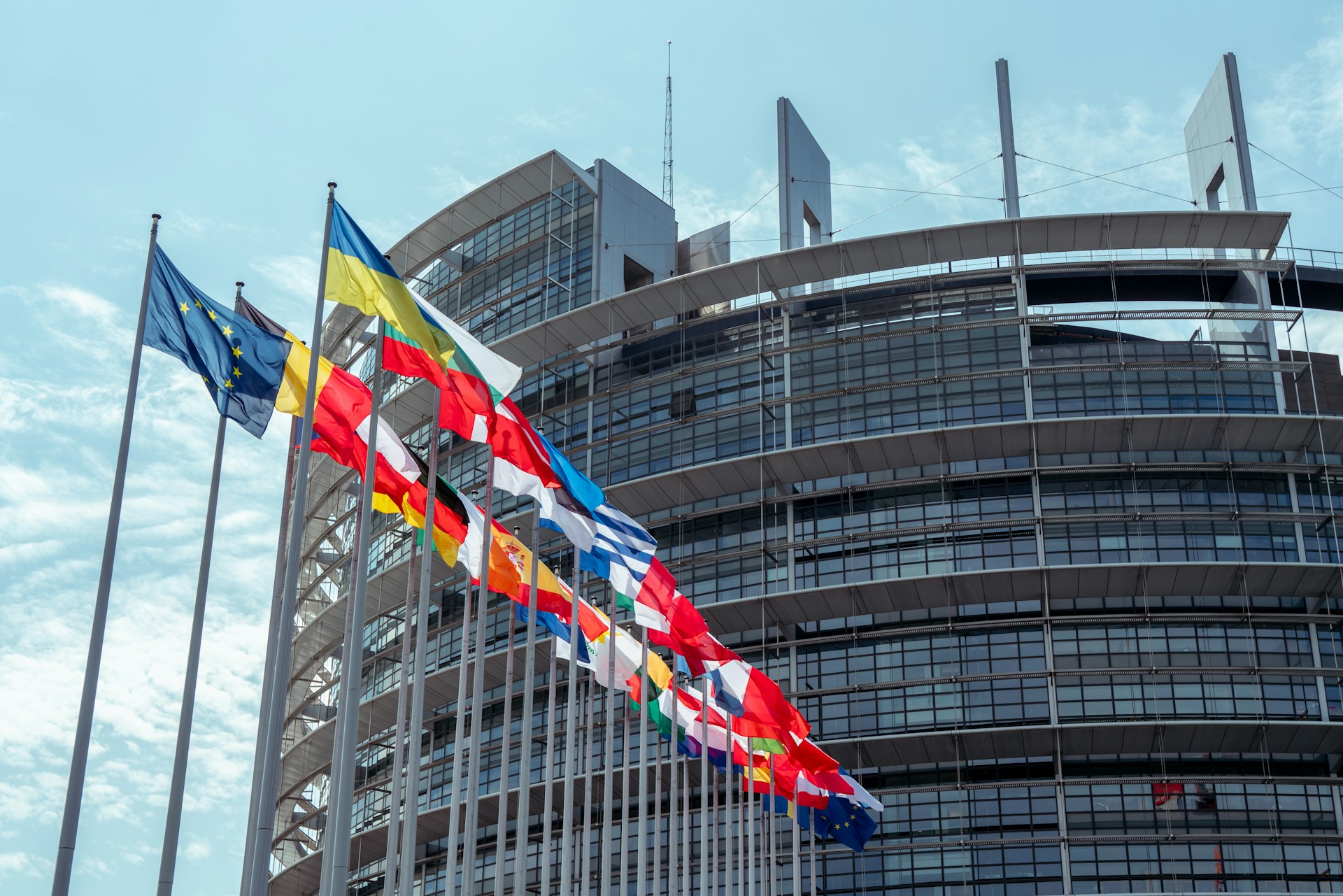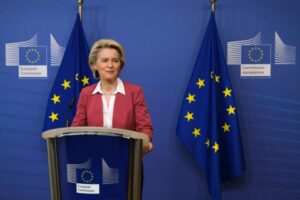On Thursday November 27th, the European Parliament confirmed the team of Commissioners who will join Ursula von der Leyen in leading the EU’s executive arm for the next five years.
The appointees have been grilled in a rigorous process, through written questions and intensive three-hour interrogations. Here is our take on how the new Commissioners will shape – or safeguard –the climate agenda in the upcoming legislative term.
While presenting her political programme, Ursula von der Leyen underscored that the European Green Deal is a bridge between her two mandates. In the previous five years, with the Fit for 55 package sketching Europe’s path to 2050 climate objectives, von der Leyen worked on building the pillars of a new greener Europe. Today, as she is starting a new term, von der Leyen places the decarbonisation at the heart of the industrial competitiveness strategy. Inspired by the Draghi’s and Letta’s Reports, the next European Commission will have to implement reforms to accelerate the transition towards green technologies, attract investments and make sure no one is left behind.
The new College of Commissioners reaffirmed its willingness to put climate action at the core of the EU agenda. However, despite the positive rhetoric and shared sense of responsibility, the hearings revealed some gaps. Social aspects of the transition remain underdeveloped, while social acceptability is key for a successful strategy. Commissioner Jorgensen, whose portfolio is key for achieving both climate and competitiveness objectives, for example, failed to answer on how to solve the problem of high energy prices. Hoekstra’s reluctance to distance himself from the fossil fuels industries, paired with instrumental attacks on Ribera may represent internal and external challenges to the Green Deal, hindering the implementation phase of the Green Deal and its future developments.
While the Commission has rallied around the climate mission, its effectiveness and ability to build broad social consensus remain uncertain and will face critical tests ahead.
Teresa Ribera – The Green Deal gatekeeper
Ribera will oversee a Clean, Just, and Competitive Transition. In her hearing, she emphasised that such a transition cannot rely on fossil fuels, as with them we import their price volatility and security concerns. Staying true to her socialist principles, she repeatedly stressed the importance of the “just” aspect of her mandate, underscoring that no transition will succeed without inclusivity. Ribera committed to ensuring the Clean Industrial Deal and Just Transition Fund focus on job creation, skills development, and community resilience, enabling local adaptation. Resilience and adaptation took centre stage during her hearing, especially in light of the recent devastating floods in Spain.
Stéphane Séjourné – The EU industrial strategy craftsman
Tasked with Prosperity and Industrial Strategy, Séjourné outlined a vision for EU industrial policy that integrates decarbonisation with strategic economic growth, focusing on a Clean Industrial Deal where industrial growth is paired with social aspects and climate conditionality. He emphasised supporting the decarbonisation of key traditional sectors like steel and chemicals while fostering new technologies such as electric vehicles and heat pumps, using tools such as lead markets and public procurement. On the latter, he committed to simplifying excessive legislative complexity and initiating multilevel consultations to improve local implementation. On financing, Séjourné advocated for a flexible European Competitiveness Fund to de-risk private investments and strengthen capital markets. On cars, he prioritised collaboration with industry and proposed a strategic dialogue to develop a plan to accelerate the sales of EVs, still he remained unwilling to engage on 2025 automotive non-compliance fines.
Raffaele Fitto – The Green Deal attorney
While not intuitively linked to climate, Fitto’s role as Commissioner for Cohesion and Reforms merits our attention because his appointment from the extreme right Italian government was at the centre of a lot of debates and due to his influence over substantial funding, which we hope will be spent (as much as possible) on climate. We are delighted to see that Fitto has embraced von der Leyen’s green agenda. Notable commitments include increasing funding for improving European housing stock and investing in social housing. He also acknowledged the link between climate change and extreme weather events. Still the governance in operationalising the expenditure of funds appears as an issue to be tackled also when handling funds for disaster recovery, as examples of the recent flood recovery in Emilia Romagna showed.
Dan Jørgensen – The Green Deal wire man
As Commissioner for Energy, Jørgensen will play a pivotal role, given the energy sector’s significant contribution to emissions. He staunchly defended the achievements of previous climate legislation and insisted there can be no backtracking. He also announced new renewable energy targets for 2040 –though notably absent were targets for energy efficiency. While he acknowledged the high energy prices that hinder competitiveness and decarbonisation and plunge Europeans into energy poverty, he provided no concrete solutions, leaving uncertainties about the effectiveness of many of the upcoming measures across the board. Much of his hearing focused on nuclear energy given he is known not to be a supporter; he however reiterated that member states are free to choose their energy mix but made it clear that European funds will not support new nuclear power plant construction.
Wopke Hoekstra – The Green Deal (timid?) guardian
As Commissioner for Climate, Net-Zero, and Clean Growth, Hoekstra’s title signals that climate action must deliver growth under this Commission. His hearing, however, left a mixed impression. When questioned about his past ties to the oil and gas sectors –both during his time as a consultant and his inclusion of fossil fuel lobbyists in the EU delegation to COP28 – Hoekstra largely evaded the issue. He repeatedly emphasised the efficient use of public funds, though concerns arise as technology neutrality resurfaces in discussions.
Apostolos Tzitzikostas – Future mobility engineer
With a mandate for Sustainable Transport and Tourism, Tzitzikostas demonstrated a solid understanding of sectoral challenges but largely relied on pre-submitted responses during the hearing missing the chance of providing crucial details. His commitment to maintaining the 2035 ICE phase-out rules is reassuring, as regulation stability is a fundamental prerequisite for market predictability, and it is crucial to drive investments in the automotive industry. However, he missed the opportunity to further disclose details on the approach and timing on the Automotive Industrial Plan his Cabinet is in charge to bring forward. Tzitzikostas’s priorities include also completing the TEN-T network, enhancing interconnectivity, and promoting digital ticketing for multimodal transport. He emphasised the need to decarbonise aviation and maritime transport working together with ICAO and IMO to create a global standard for sustainable fuels. Finally, he assured to tackle carbon leakage in maritime emissions to secure trade and protect European ports competitiveness.
Dubravka Šuica – The Green Deal explorer
Šuica, as Commissioner for the Mediterranean, provided a broad overview by emphasising the region’s strategic significance, and openly acknowledging the impact of climate change as one of the main challenges for the region. She will be leading a new Directorate-General for the Mediterranean (DGMED) which, in the domain of energy, will focus on renewable energy and clean tech collaboration. Decarbonisation and related mutual benefits for EU and Southern Mediterranean countries will be tackled within her Trans-Mediterranean energy and clean cooperation initiative. However, she avoided specifics on gas transition strategies, raising uncertainties. Moreover, the New Pact for the Mediterranean that she will be asked to deliver as the core of her mandate, with its emphasis on strategic bilateral partnerships risks sidelining broader regional cooperation – including on the energy and climate dimension. Šuica’s lack of clarity on funding and operational details further complicates an already expansive portfolio.
Photo by Lukas S







